Jim Wallace: 'My faith was a comfort when I nearly died'
Jim Wallace has a pretty packed schedule for a man who, not so long ago, almost died. There are the Sundays singing in the choir at Orkney’s St Magnus Cathedral, the Monday dashes to London for the Lords Statutory Inquiries Committee, and the regular grandparenting trips to Bridge of Allan, where he and wife Rosie recently bought a house. In between it all there’s his work as vice-president of the National Churches Trust to fit in and, when we meet for coffee and cake in early March, the small matter of an amateur operatics performance – Gilbert and Sullivan’s Trial by Jury, no less – to prepare for. It is hardly a diary for the faint hearted.
But Wallace’s heart, though fixed, was recently faint. Though we’re meeting to discuss the imminent 25th anniversary of the Scottish Parliament – an institution he spent many years campaigning for and served in as both deputy first minister and, on three brief occasions, stand-in FM – we had originally planned an interview for late 2022. As the date of our meeting approached, though, Wallace emailed me from his hospital bed to say he’d had “serious and wholly unanticipated cardiac surgery” and, while he was making good progress, would not be able to meet the following week as planned. Overstatement may not be Lord Wallace of Tankerness’s thing, but as he details exactly what it was he had been through it is clear that the word ‘serious’ was not doing nearly enough heavy lifting in that statement.
I knew there was a possibility I would die … I was conscious of my faith, it was a comfort
“For much of the summer and autumn of 2022 I didn’t feel right,” he says, sipping on a flat white amid the bustle of an Edinburgh cafe. “I’d had a virus at some point that wasn’t Covid and the GP thought I’d be better to do a blood test. As a result of that he thought I needed further tests, including an echocardiogram. I got an appointment for the first week of December and rolled up at Balfour Hospital in Kirkwall. I thought I’d have the test and with a bit of luck I’d get the result by the new year, but instead I got immediately admitted to A&E. There was no waiting time – I just walked across the corridor. I immediately realised that this was not routine by the fact they were very loath to let me move. I think they thought I was about to imminently die.”
With the air ambulance unable to land, Wallace was helicoptered to Aberdeen Royal Infirmary by the Shetland Coastguard. There, doctors who were initially perplexed by the fact he hadn’t been having any chest pains told him he had been walking around with a dissected aorta that would require an urgent medical repair. In hindsight, Wallace thinks he remembers feeling the tear happen, with a one-off event earlier in 2022 seeing him experience “searing pain” that went from his head all the way down his body to his feet. The pain never returned, but by the time he was admitted to hospital he was facing a life or death situation. From Aberdeen he was transferred to Edinburgh and in a six-hour operation the artery that carries the blood from his heart to the rest of his body was replaced.
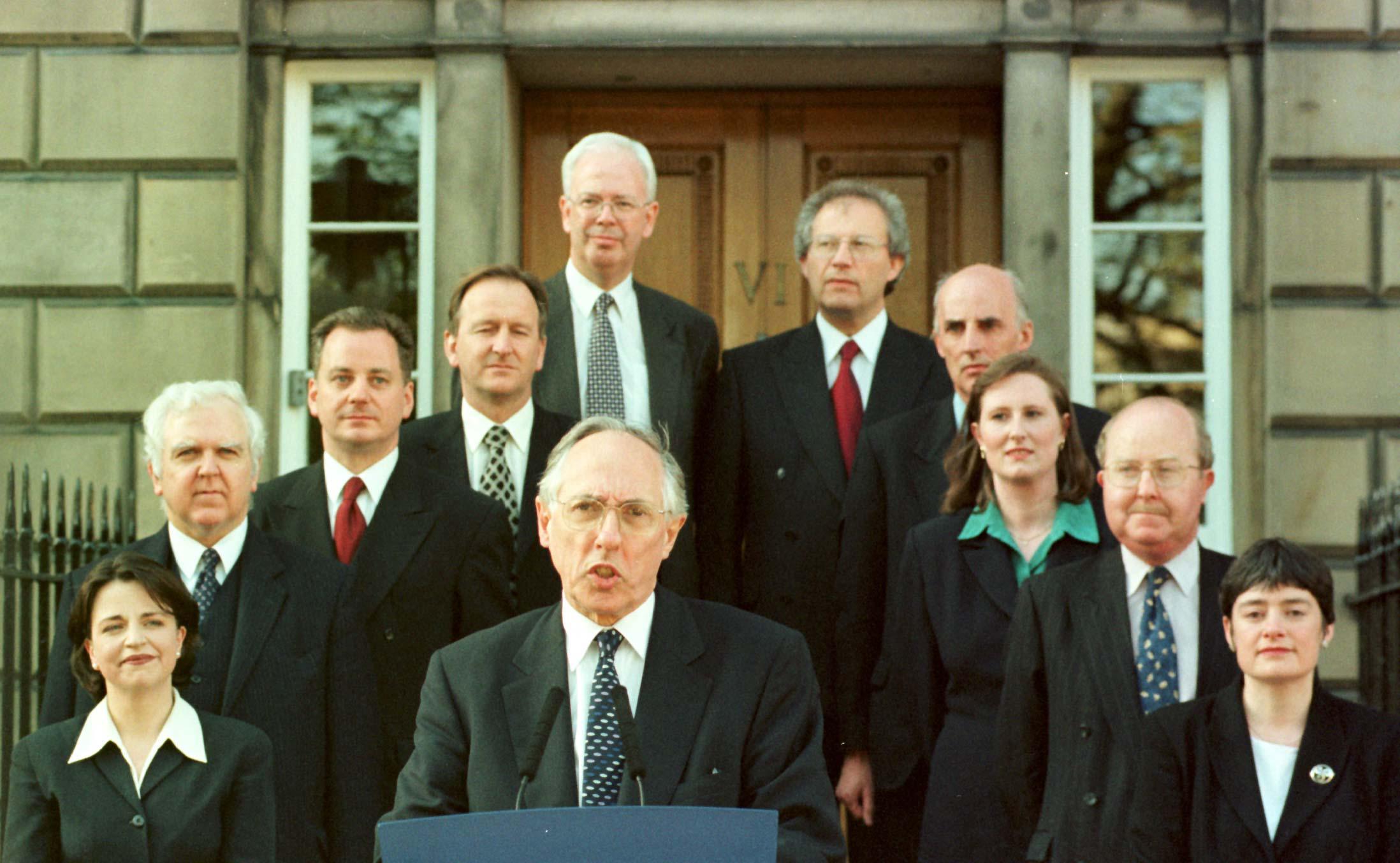 Scotland's first-ever cabinet, with First Minister Donald Dewar at the front and Deputy First Minister Jim Wallace at the back | Alamy
Scotland's first-ever cabinet, with First Minister Donald Dewar at the front and Deputy First Minister Jim Wallace at the back | Alamy
“I never had proper time to worry about it,” Wallace says, when I ask how he felt being rushed from medical pillar to medical post. “If I’d been told I’d be having a major operation in three weeks’ time I’d have been anxious. I’m not saying I wasn’t anxious, but I only had two nights to think about it and I did get some sleep. They told me the odds were 80 per cent success. I felt they were good odds so I signed the consent form.”
It is, perhaps, the response of a politician to weigh up the odds in such a dispassionate way. But then Wallace is a consummate politician, and the approach is similar to the one he took when considering whether to take his party into a power-sharing agreement with Donald Dewar’s Labour in the first sitting of the Scottish Parliament. Wallace, who when the parliament opened in May 1999 had been the Lib Dem MP for Orkney and Shetland for close to two decades and leader of the party in Scotland for close to one, makes the point that Holyrood had been designed to be led by coalitions or minority governments so he was perfectly willing to help form one. He had not been willing to accept all of Dewar’s terms, though.
“Proportional representation meant that it was unlikely any party would get an overall majority and there was an expectation that the first government might be a Labour-Liberal Democrat one, although there was no guarantee,” he says. “I knew that if there was a coalition we’d seek to reach agreement with the party with the largest number of seats. It was quite obvious that that was going to be Labour but we still required an agreement and there wasn’t going to be an agreement at any price. What Donald Dewar offered me was two posts in the Scottish cabinet, but to me that seemed like two Lib Dems joining a Labour cabinet. I said ‘no, if we’re going to have a coalition we need to have an agreement around what we’re coalescing about, what our programme for government will be’. I’d actually given it a heck of a lot of thought – I had 28 pages of thoughts. We settled on 24 and he accepted them.”
The deal formalised the working relationship between the pair, with Dewar as first minister and Wallace as both his deputy and justice secretary, but in reality they had been collaborating for years, most notably on the Scottish Constitutional Convention that ultimately led to the creation of the parliament. The programme for government Wallace was so keen to get consensus on set the tone for what was to come at Holyrood, with the coalition pledging to create “a more just Scotland, where a decent quality of life and warm affordable housing is available to all and where individuals have the opportunity to fulfil their potential”. Free nursery places, investment in broadband, land reform, protection for the elderly against flu – all those things made it into the document, but the partners’ inability to coalesce around university tuition fees famously almost saw the agreement fall apart.
Section 35 wasn’t anti-devolution, but was meant to be there as a longstop if there was something that overstepped the mark
“In negotiations we had two small teams who went through the manifestos and worked out where there was common ground and where there wasn’t common ground,” Wallace recalls. “The key sticking point was tuition fees, which Labour had just brought in [across the UK]. On more than one occasion we were going to pull out. I said ‘Donald, we’ve given this our best try but it’s not going to work – we’ll be a responsible opposition partner and won’t try to block you’ […] It was a sticking point because it was something we’d made quite a bit of and you saw what happened at a UK level when we [the Lib Dems] went back on it [the UK party dropped its opposition to tuition fees on forming a coalition government with the Conservatives in 2010 and at the next election lost 49 of its 57 seats].”
Despite winning the tuition-fee battle with Dewar, Wallace says hindsight has shown it was implemented in such a way that it actually damaged the university sector and that that, ultimately, has disadvantaged the very people the policy was designed to help.
“I always regretted that we never envisaged that this would be done at the expense of Scottish universities,” he says. “The quid pro quo of no Scottish fees was that we properly fund Scottish universities but they are not properly funded. It was to help Scottish students from less well-off backgrounds to access higher education but now we’re finding that those from even modest backgrounds can’t access education. It’s happening because they [successive governments] haven’t kept up the funding and universities can earn more from enrolling foreign students.”
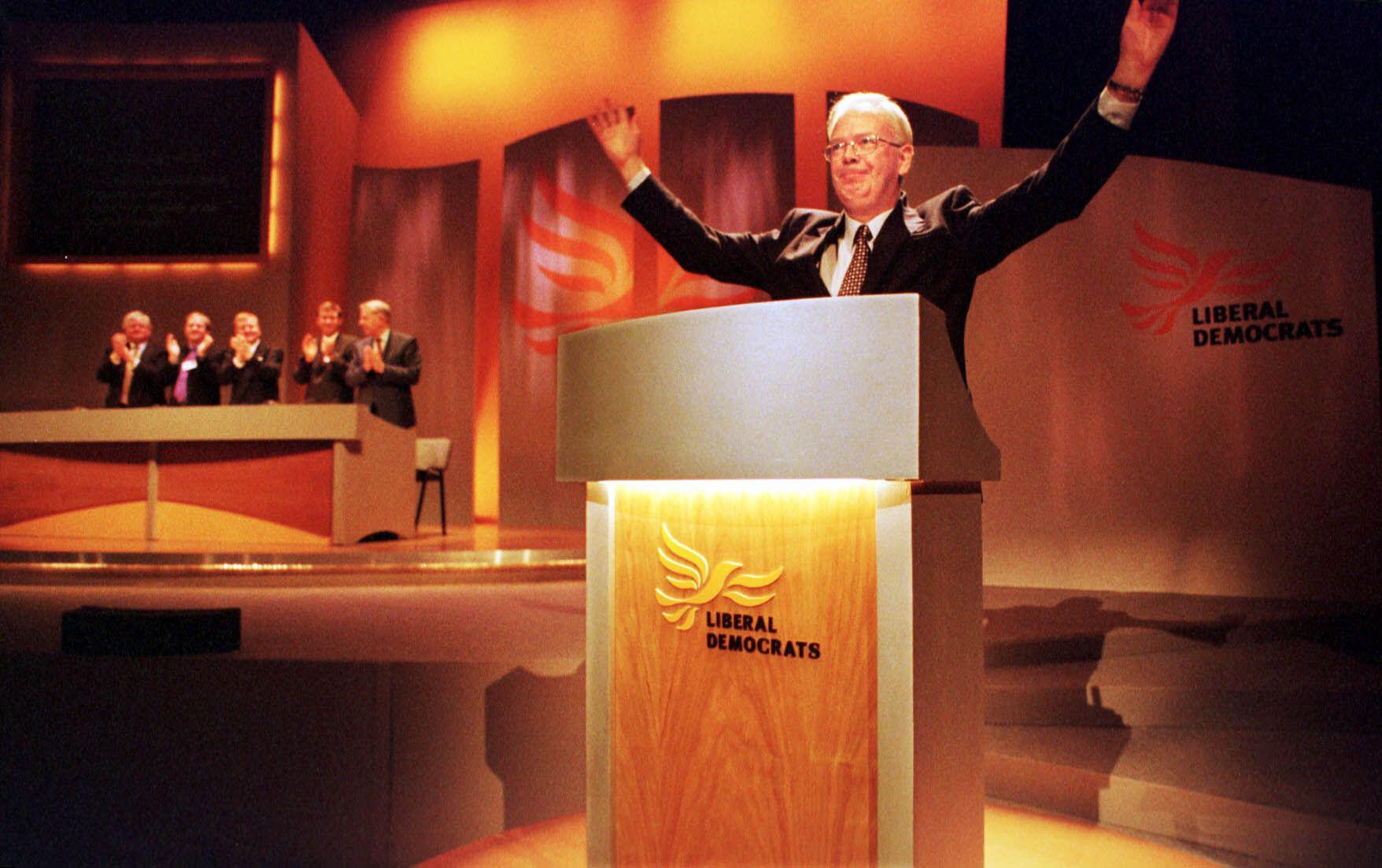 At the Lib Dem conference in 1999, the year he became Scotland's first deputy first minister | Alamy
At the Lib Dem conference in 1999, the year he became Scotland's first deputy first minister | Alamy
Still, that first session of the parliament was a hopeful one, with members buying onto Dewar’s vision of a chamber that “worked together” in a “new forum of democracy”. Dewar embodied that, Wallace says – “I enjoyed working with him. He was someone who wanted solutions. He was rigorous and had huge integrity and a wicked sense of humour” – though he feels that sense of working together, of collaborating across party lines, has withered as the parliament has aged. Notably, the first bill ever passed by MSPs was rushed through in record time and, while the opposition was critical of what the government was trying to do, its criticism was constructive.
“We’d only just established the parliament when the sheriff of Lanark released a prisoner in Carstairs who had killed his neighbour,” Wallace says. “There was a loophole in the law that meant he could be released – he hadn’t been sentenced to imprisonment but detention in the state hospital. It was established that he was not getting any treatment that would help him and […] the sheriff took the view it was wrong to detain him. The loophole had aways been there [in UK law], it just so happened that we were on the receiving end when it was found, but we brought in emergency legislation within five weeks. The Privy Council upheld the legislation and commended the speed with which the Scottish ministers had acted. It was new ground. It was exciting, though that was tempered by the seriousness of it and the need to get it right. The opposition were fairly critical. If you go back through the debates they were robust but there was an acceptance that it was all on the right lines.”
Compare that with the way more recent laws, such as the now-shelved Gender Recognition Reform Act, have been brought in and the contrast is stark. Parties were so entrenched in their positions when the legislation was making its way through parliament that none was willing to give any ground and no compromise could be found. The result was bad law-making that took up swathes of parliamentary time, caused vitriolic exchanges both inside and outside the chamber, and ultimately had to be abandoned because it strayed beyond what the Holyrood administration was entitled to do. The SNP-Green government claimed that Westminster’s use of a Section 35 order to block the legislation was “an attack on devolution” that the Westminster government is likely to employ again and again. Wallace, who was in Westminster when the Scotland Act Section 35 is part of was passed, begs to differ.
“The Section 35 stuff, I went back to check what I said at the time, and I was critical of it at first,” he says. “It wasn’t anti-devolution but was meant to be there as a longstop if there was something that overstepped the mark. I went back and read it and I was broadly supportive of what Donald Dewar was doing. The only people not supportive were the Tory frontbench – even Alex Salmond [who was an MP and leader of the SNP at the time the Scotland Act was passed] wasn’t overtly hostile to it.”
After he stood down from Holyrood in 2007, Wallace, who had been an advocate before entering politics, went back to the bar, but his rekindled legal career, as far as practising is concerned, was short-lived. “I was instructed on a couple of cases but I was only there for about four weeks,” he says. He was elevated to the House of Lords later that year and, in 2008, was appointed to the Calman Commission on devolution, joining the team that made a series of recommendations on the Scottish Parliament’s revenue-raising powers. After that concluded Wallace was appointed Advocate General for Scotland, advising the coalition government on Scots law in a role that was created to fill the void left when the lord advocate and solicitor general were transferred from Westminster to Holyrood in 1999. Then, in 2021, he was made Moderator of the General Assembly of the Church of Scotland.
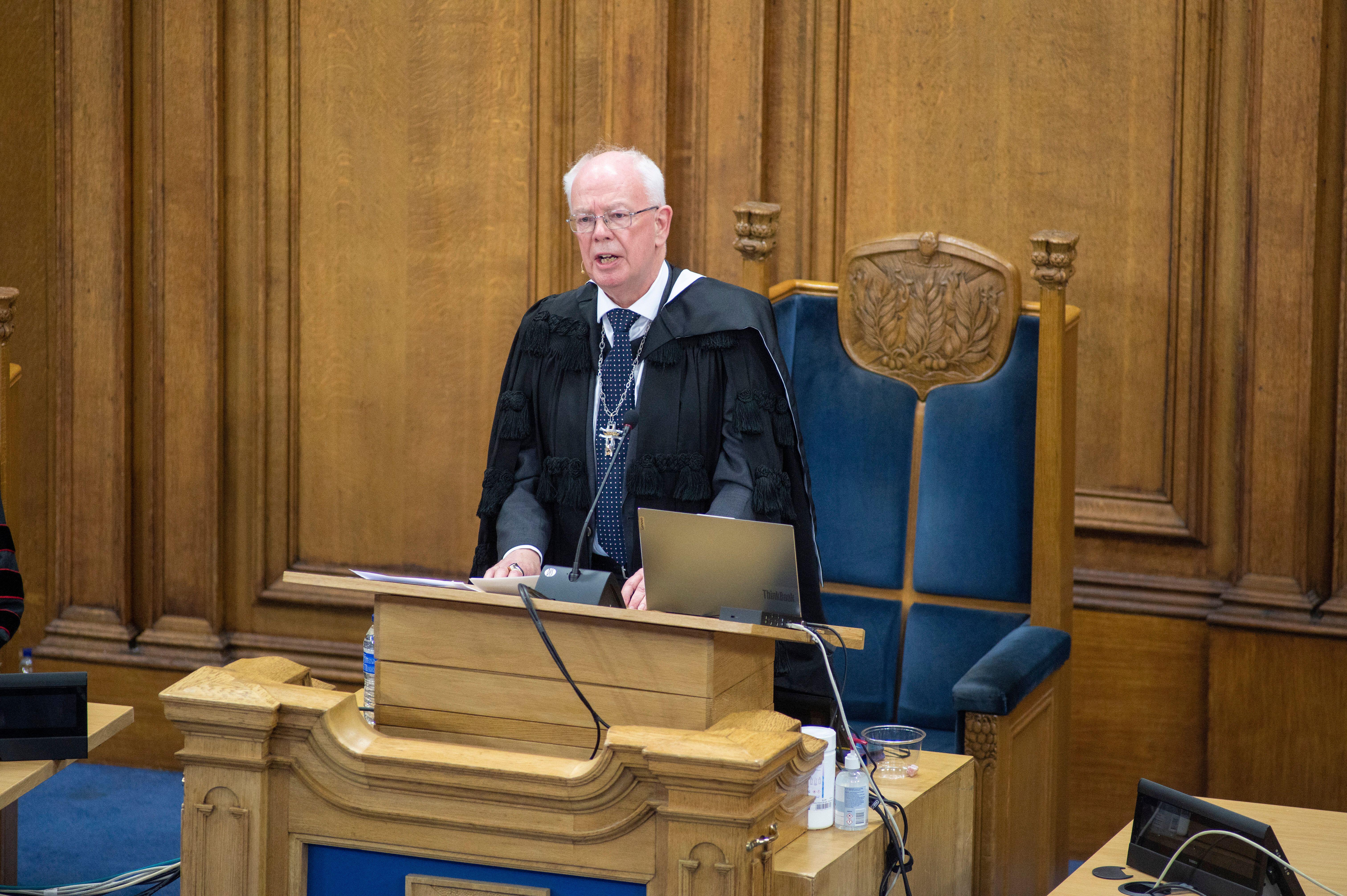 Wallace in 2021 during the ceremony to install him as moderator of the General Assembly of the Church of Scotland | Alamy
Wallace in 2021 during the ceremony to install him as moderator of the General Assembly of the Church of Scotland | Alamy
The church and religion have always been a big part of Wallace’s life. His father, an accountant, was, he says, a church elder for 64 years and he followed in his footsteps when he was ordained as an elder in Stockbridge Parish Church while still in his 20s. After moving to Kirkwall on being elected the local MP in 1983 he joined the kirk session at St Magnus and has been part of it ever since. Still, to be asked to put his name forward for the moderator’s job was, he says, highly unusual.
“During lockdown I got a phone call from my former minister saying that he and another minister, a former moderator, thought it would be a good idea if I applied, but I was very sceptical,” he says. “I didn’t think it was me – I have no theological training and I found the idea funny. When I said I couldn’t because I had no theological training they said they would take that as a plus. I was only the second non-minister moderator since the Reformation [in 2004 Alison Elliot became the first woman and the first non-ordained person to hold the post].”
Though Wallace’s year in office, which ran from May 2021 to May 2022, was tempered by the pandemic, the work he did as moderator was broadly political in nature. Indeed, he was in the chair when the General Assembly voted to allow ministers to perform same-sex marriages – “it was a challenging week, I can tell you that” – and it was during his year in post that the Church of Scotland signed its St Andrew’s Day Declaration with the Episcopal Church, a historic pact that promised greater collaboration between the two previously entirely cloistered denominations. He was also involved in the discussions that led to the Church signing a similar deal – the St Margaret Declaration – with the Catholic Church in Scotland the following year.
“Even 10 years ago that would have been impossible,” Wallace says. “It was born out of a desire to focus on the things that unite us and I’m really pleased I was involved in that. Covid helped a lot. It definitely brought faith leaders and denominational leaders together and gave them a better understanding of each other.”
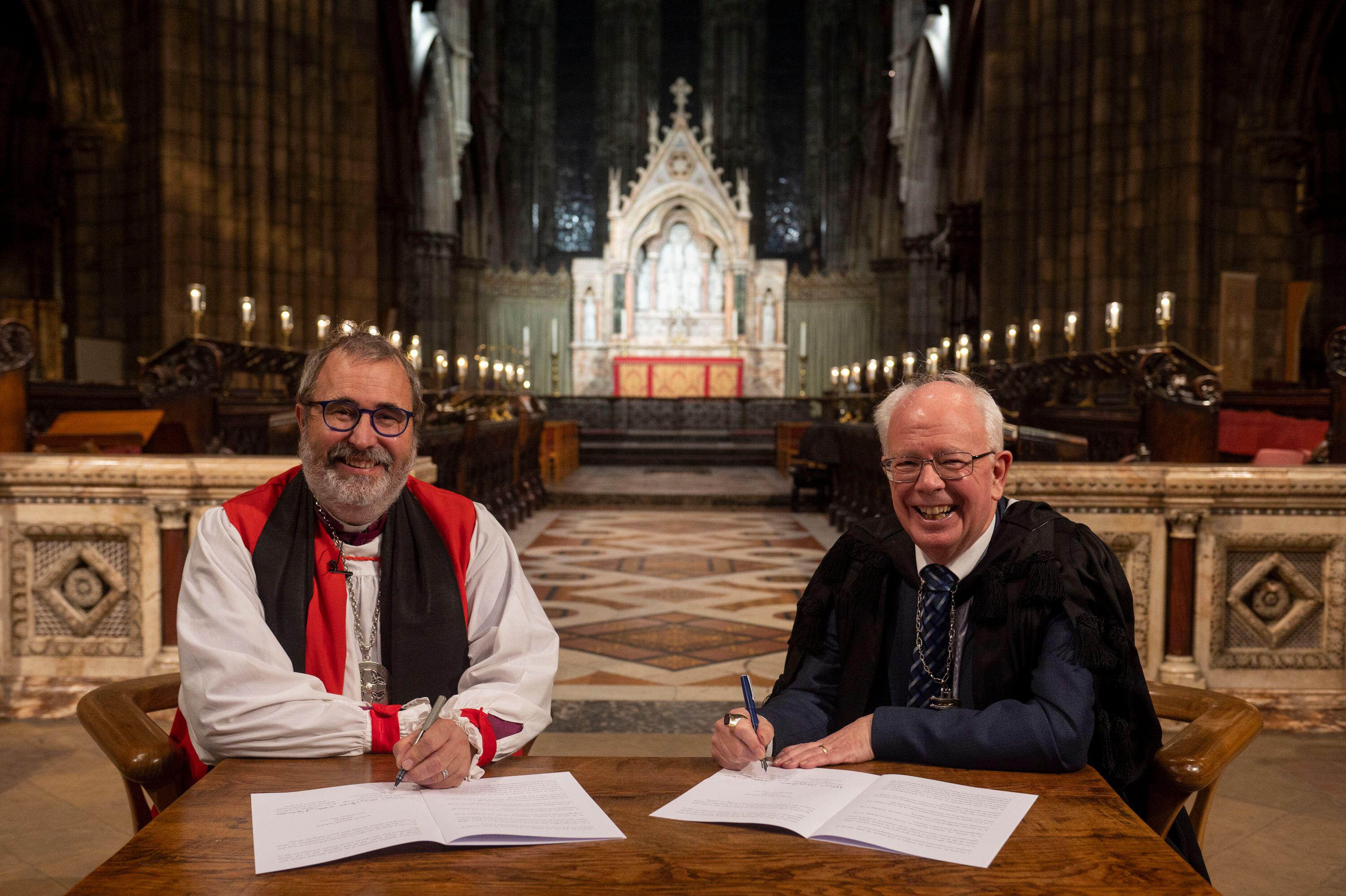 Signing the St Andrew Declaration in 2021 along with Scottish Episcopal Church Primus Rev Mark Strange | Alamy
Signing the St Andrew Declaration in 2021 along with Scottish Episcopal Church Primus Rev Mark Strange | Alamy
I first met Wallace in the summer of last year when I was writing an article on the interplay between politics and religion. There had been an outcry when Kate Forbes, a committed Christian and member of the Free Church of Scotland, put her name forward for the SNP leadership, with detractors saying her strict religious beliefs made her unfit for office. Wallace disagreed, telling me at the time he “strongly believed” there’s a place for people with religious views in politics and that “it would be all the poorer if there wasn’t”. “When I was being interviewed to become moderator one of the things I said was that Jesus said ‘I came to give life and people should have life in abundance’,” he said. “There are many ways to interpret that, but if you don’t have good health, are not educated, don’t have a stable roof over your head, don’t know where to get your next meal, then you don’t have life in abundance. Those things are all political. One of my reasons for going into politics was a belief that people should have life in abundance.”
As we chat he elaborates on the point he was making then, telling me that, while he’d initially thought the idea of him becoming moderator was ridiculous, in actuality it made sense because his religious life is an extension of his political life, just as his political life is an extension of his religious one. To suggest the two shouldn’t mix is, he says, nonsensical.
“I was very much brought up as a Presbyterian and church has been a big part of my life,” he says. “I found that it meshed with my political life – which prompted which? It was probably faith that prompted me to take up politics, although I’ve never had much time for people who believed that God was on the side of their political party. As Disraeli said, ‘I don’t object to Gladstone having the ace of trumps up his sleeve but I do object to him saying God put it there’.
“I was hungry and he fed me, I was a stranger and he took me in – those translate very readily into the political agenda. I’ve known Christians and people of faith in all parties. We often have more in common than the things that divide us […] If you look at some of the people that actually changed things, they have been driven by faith – Martin Luther King, Desmond Tutu, William Wilberforce. They were motivated by their faith to bring about change. It depends on how you do God. I have never hidden the fact that I’m a committed Christian but it was never my first line on the doorsteps. I don’t think you should hide your beliefs, and people should judge you accordingly. If that’s what motivates you people should recognise that.”
As with political convictions, Wallace says he has questioned his religious beliefs on more than one occasion but that “doubt is often the key to faith” and he continues to find it a comfort. Indeed, though his wife and two daughters were by his side throughout his hospitalisation last year, providing the non-medical care and support he needed to get him through, he says that, knowing there was every chance he would not survive, his religious faith was hugely important to him.
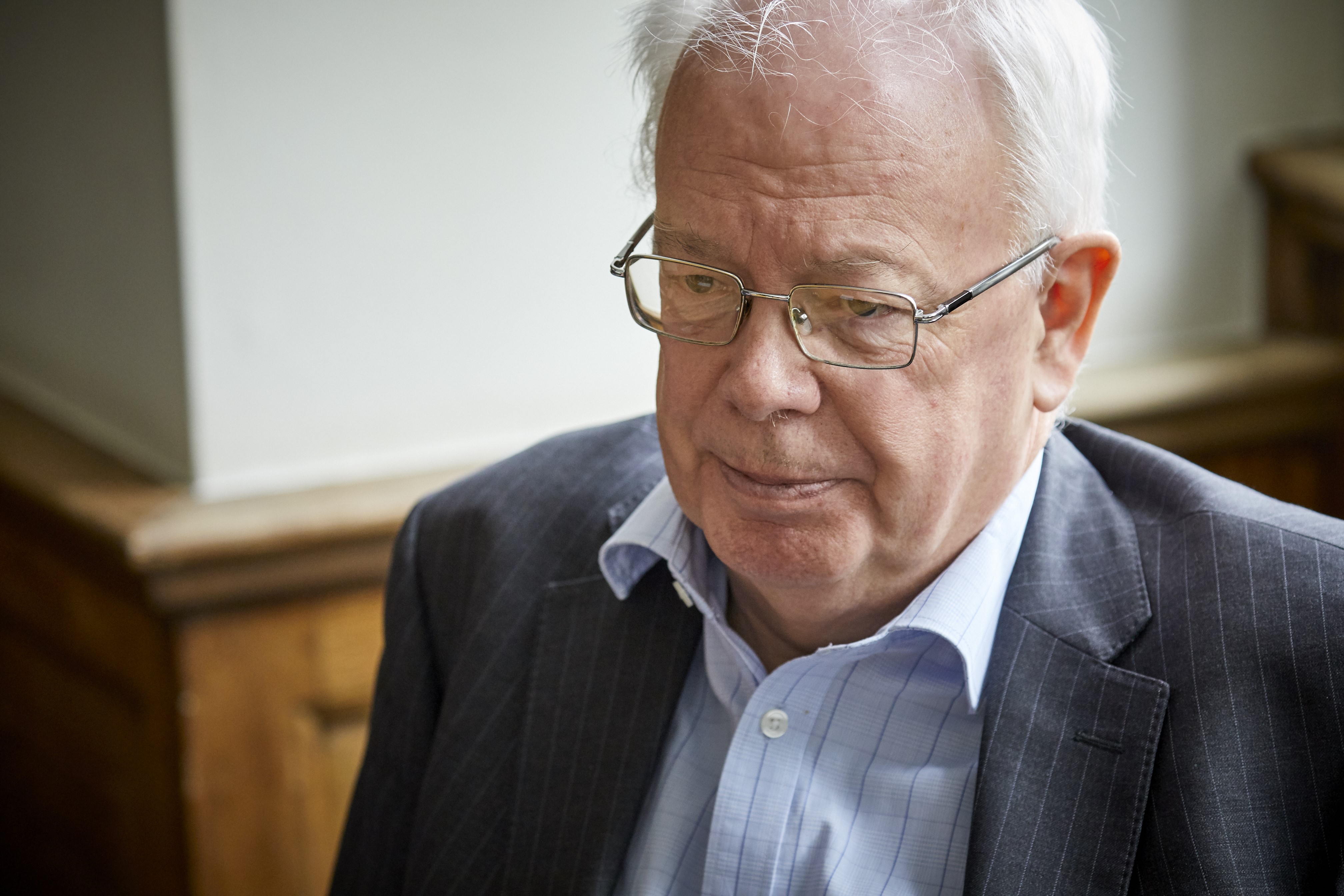 Picture by Alister Thorpe
Picture by Alister Thorpe
“I knew there was a possibility I would die,” he says, matter-of-factly. “In some respects, I’d been going around for five or six months with the possibility I could have died. My former GP, who has since retired, said in his entire experience he’d only ever had one patient with a dissected aorta before and that it’s rare to have that and live. I wasn’t scared in the hospital but I didn’t really have a chance to worry about it. My minister sent me a very good prayer about praying for the skilful hands of those who operate. I was conscious of my faith, it was a comfort.”
After two hours of talking, Wallace remains as chatty as ever as we make our way up Edinburgh’s Leith Walk and on to Waverley Station. He’s looking forward to performing in Trial by Jury, in part because it was previously postponed by Covid and in part because it is taking place in the novel setting of Kirkwall Sheriff Court. And, with the talk of courts and juries taking us there, he says he is emphatically opposed to the Scottish Government’s much-debated plan to pilot juryless trials in sexual offences cases (he’d also vote against the assisted dying bill being brought forward by his Orkney Islands successor Liam McArthur, a fellow Lib Dem, if he was still an MSP). It is his view, as both a lawyer and a former justice secretary, that judge-only trials would be an affront to democracy and justice.
We say our goodbyes at the station and Wallace rushes off to catch his train, concerned that he’s late to help Rosie out with grandparent duty. A few weeks later I check out how that performance in Kirkwall court has gone. A review in The Orcadian notes Wallace’s suitability for the part of counsel for the plaintiff given he is, in fact, “the real Lord Jim Wallace KC” and calls the show both “a celebration of local talent” and “a captivating operatic experience”. The showman in Wallace – he is a politician, after all – must surely be pleased with that. I suspect the final line of the piece will please him more, though: “All proceeds from each performance contributed to the Malawi Music Fund, the Orkney charity that aims to enable orphaned children in Malawi to transform their lives through education.” Amen to that.
Holyrood Newsletters
Holyrood provides comprehensive coverage of Scottish politics, offering award-winning reporting and analysis: Subscribe